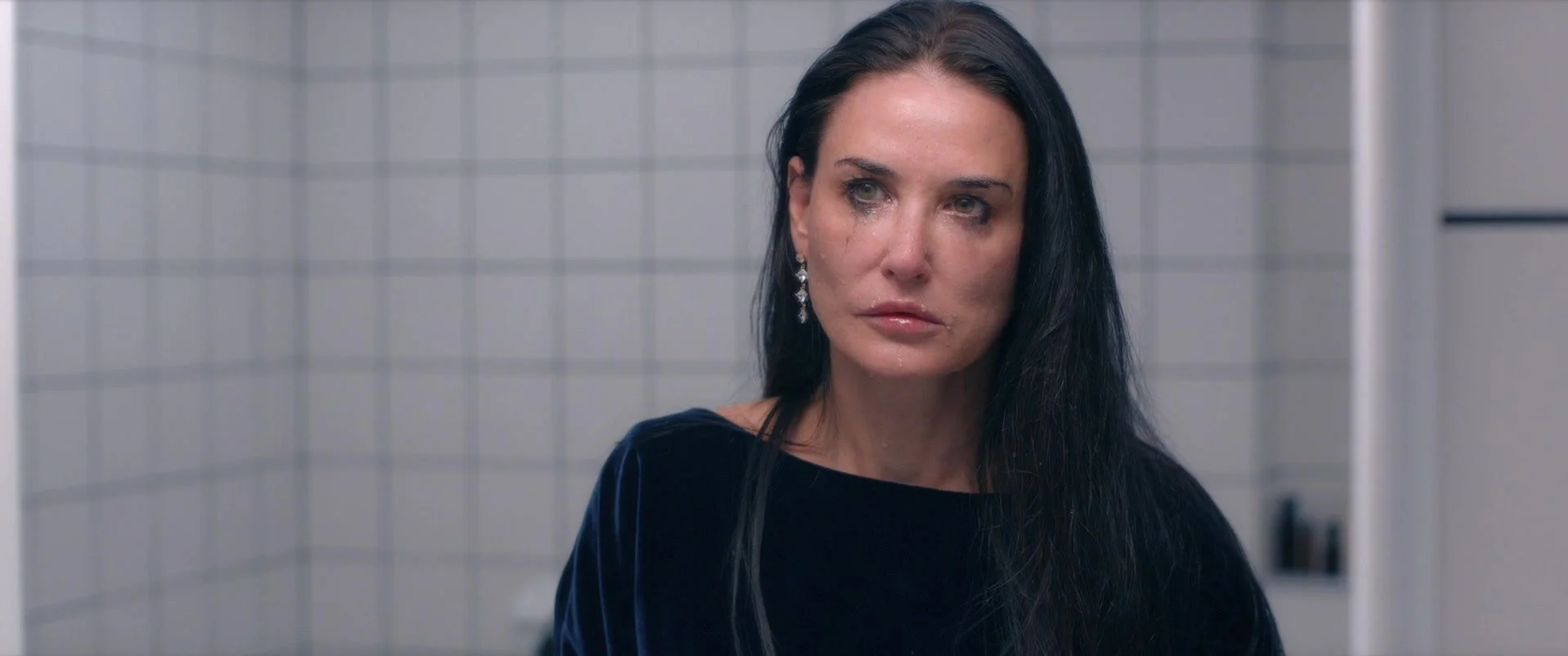The Substance
Released September 20, 2024
Written and Directed by Carol Fargeat
Cinematography by Benjamin Kračun
* No Spoilers *
We aren’t often forced to confront the grotesque reality that we are our own worst enemies. Self hatred, societal pressures around aging, and the sociopathic desire to be adored are an unfortunate yet quintessential pillars of modern society. We may not like to admit it but social media, celebrity, pop culture and billion dollar industries constantly push this superficial pursuit down our throats. Even the most resolute and strong-willed have to fight against its pull.
The Substance thrusts that reality in your face in a way that is both disturbing and poignant. My discomfort was severely outweighed by how invested I was in the plot. At times ridiculous and over the top, this is the epitome of modern body horror and social commentary filmmaking.
The story follows Elizabeth Sparks, played by Demi Moore—an aging Hollywood starlet offered a second chance at youth and fame with a procedure that creates a “new and improved” version of herself, named Sue. The titular “Substance” comes with a strict set of rules that will surely be bent and eventually broken.
Coralie Fargeat screenplay was awarded the Best Screenplay of the 2024 Cannes Film Festival, and I can see why. A masterclass in the effectiveness of showing instead of telling. There are large blocks where there is almost zero dialogue, yet so much is conveyed just through what’s on screen. There are sections where twenty or thirty minutes pass with only a single line of dialogue. These aren’t mind blowing lines either—maybe just a short “Hello” or a brief passing comment—because the visual storytelling does more than enough. Truthfully, some of the dialogue is so ridiculous that hearing a character speak sometimes would undercut the immersion. Who needs great dialogue when a picture can tell a thousand words?
What The Substance is saying is not at all subtle, yet it is deeply enigmatic. This movie takes a hold of you and doesn’t let go. Its sci-fi elements are not grounded in reality nor do they need to be. Part of how this film mirrors society is through recognizing its own absurdity. That’s the point. We all, in some way, grapple with insecurity and superficial concerns, by exaggerating those to the extreme the film illustrates how ridiculous we can be. Sometimes a story that is so in-your-face avoids feeling preachy because of how self-aware it is.
Every male character in this movie is an absolute caricature, with Dennis Quaid’s role as a sleazy producer being the prime example. He is immediately shown in grotesque, extreme close-ups. In one scene he devours a plate of shrimp, his lips smacking with a putrid squelch. He is vile and has no redeeming qualities—disgusting inside and out. I haven’t seen a movie portray old white men with this much contempt since some classic Spike Lee joints.
At the same time, the true antagonism comes from within. The duality of our main characters, Elisabeth and Sue, is so well balanced. You pity them as they antagonize each other, despite being one person split into two versions. This dynamic creates a tense and kinetic push-and-pull. Neither is a hero; both suffer at the hands of their own monstrous and self-destructive desires.
The contrast in how the world perceives them is expertly portrayed through visuals alone. The same close-ups that objectify or glamorize can also demean and shame depending on the context. The cinematography deliberately weaponizes the “male gaze”. Though exaggerated and gratuitous, the indictment of society’s objectification of the female body is undeniable. The Substance shows exactly how a camera lens can turn the human body into a commodity, a mass of parts rather than a person.
The visuals and sound design carry the narrative and immerse you in the mental state of the characters. Reminiscent of Kubrick’s The Shining, Fargeat uses narrowing hallways and claustrophobic paths to shrink or enlarge characters as they move through the space. I’ve also never experienced such an accurate depiction of feeling faint and on the verge of losing consciousness. The sound is muffled but deafening and the frames skip as the character loses balance.
Demi Moore is perfectly cast and her performance, while deliberately campy at times, shows impressive range. She is pitiful and desperate in a way that remains sympathetic. As much as she is victimized by her own insecurities, Moore’s nuanced performance conveys a helplessness and desperation that is surprisingly relatable. This might be Moore’s best performance of her career.
Margaret Qualley (Kinds of Kindness) absolutely carries the film with her portrayal of Sue, Elizabeth’s “new and improved” persona. Qualley brilliantly mirrors Elizabeth’s pathetic desperation, adding a layer of greedy narcissism that makes her performance even more compelling. At times this is captured solely with a shift in her eyes as they glaze from gleaming elation to panic in an instant.
By the time I finally watched this there was already a lot of positive buzz, but it completely lives up to the hype. Original, challenging, and poignant, I was gripped the whole time. The Substance is not light viewing nor is it easy subject matter. Yet its dark humour and visual flare makes it as entertaining as it is impactful. Without spoiling too much, the ending was so insane that it lost me for a bit. However, the final shot and its mirroring of an earlier scene, provided a striking exclamation point that won me over again.
An excessively gratuitous climax and campy dialogue are my only knocks against this otherwise powerful film. Ironically, the message of this film is strongest and speaks loudest when it is silent. Whether you appreciate the over-the-top approach or not, this is sure to make you think, even if it’s more than a little uncomfortable.
8.5/10 - A harsh critique of societal narcissism and the overwhelming industrial forces that push us to destroy ourselves for the sake of vanity. This incredibly original and hard hitting film stands out amongst the body-horror and dark satirical comedy genres. Through nuanced performances and masterful visual storytelling, The Substance lays bare the absurdity of modern beauty culture, the power of self-hatred, and the desperate loneliness that can follow.
*Available to stream on MUBI now









A review of Carolie Fargeat’s satirical body-horror starring Demi Moore and Margaret Qualley.